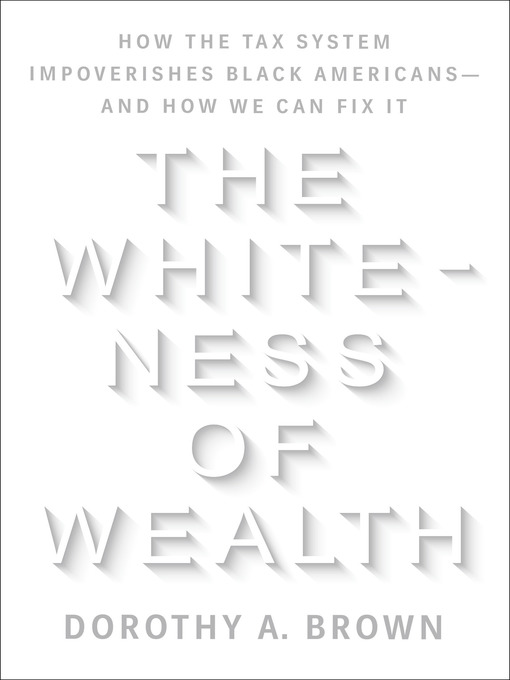
The Whiteness of Wealth
How the Tax System Impoverishes Black Americans—and How We Can Fix It
- اطلاعات
- نقد و بررسی
- دیدگاه کاربران
نقد و بررسی

January 11, 2021
Emory University law professor Brown debuts with an illuminating exploration of how U.S. tax policies exacerbate the Black-white wealth gap. She begins with tax benefits afforded to married couples, explaining that single-earner households, which are statistically more likely to be white, pay less taxes than households in which both spouses work, which is more common in Black families. She also shows that Black homeowners accrue less wealth overall due to the lower cost of homes in majority-Black neighborhoods, examines how income inequality and different tax policies for for-profit and nonprofit schools make it difficult for Black Americans to pursue a college education, and suggests that Black employees who have access to a retirement account contribute less than their white colleagues because they are supporting other family members disadvantaged by systemic inequality. Brown’s suggested reforms include reducing the number of deductions and exclusions in the tax code, and implementing a progressive tax rate for wealthy individuals and lower rates for those earning less than a living wage. Brown enriches her detailed data analysis with personal anecdotes and brisk history lessons. Policymakers will benefit from this expert look at a rarely discussed, yet seemingly fixable, piece of the racial inequality puzzle.

January 15, 2021
Black Americans endure endless injustices and indignities--not least of which are the inequities built into what is supposed to be a neutral tax system. Brown went into tax law, she writes, because she imagined that "as far as tax law was concerned, the only color that mattered was green." Her effort to escape racism didn't work as expected. Over the years, she has worked to uncover biases--both intentional and not--in the federal tax system. For instance, the joint tax return system was the product of a ploy on the part of Henry and Charlotte Seaborn, a wealthy White couple who filed a suit that went all the way to the Supreme Court. They lived in a community property state, and when Henry declared that half of his income was his wife's and their marginal tax rate should be half what it was, the IRS rejected the claim until the justices ruled in the Seaborns' favor. But what of states where community property was not the law? "This was a violation of the horizontal equity principle underpinning the progressive tax system," Brown writes, and it penalized Black married couples who, unlike Whites, earned roughly equal pay and could not lower their tax burden by transferring it to their partner. Similarly, notes the author, mortgage interest deductions benefit White holders disproportionally, in part because home values are lower in marginalized communities. "Homeownership is not a straightforward wealth builder for black families," writes Brown, "because the only guaranteed return on their investment is to buy in a community where they will be a small and vulnerable minority." School loans are another realm of difference, leading Brown to propose that wealthy institutions such as Yale be taxed to fund scholarships. Among her other remedies are taxing inheritances and, more daringly, eliminating exclusions so that "all income is taxable," thus doing away with inequitable shelters that favor White over Black taxpayers. An eye-opening look at race-based economic biases, with reasonable steps to undo them.
COPYRIGHT(2021) Kirkus Reviews, ALL RIGHTS RESERVED.

February 1, 2021
Emory University law professor Brown (Critical Race Theory, 2003), also a contributor to Forbes, the New York Times, and the Washington Post, writes brilliantly and lucidly on systemic racism and injustice within the American tax system. She shows how it has perpetuated preferential treatment of white Americans while promoting discrimination toward Black Americans for decades. In addition to her personal narrative, Brown draws on numerous economic studies, legal documents, congressional policies, and statistics to expose how deeply problematic the tax system is, with its jarring loopholes. Writing with clarity and deftness, Brown cites many examples of unfairness and bias within the system, from housing to loans to joint-filing for married taxpayers. This is an eye-opening, well-sourced and -argued account of tax law and economic policy at the intersection of racism and social history. Weaving personal experiences into her compelling study, Brown highlights the enduring problem of the increasing wealth gap between Black and white Americans, and the urgent need for tax reform.
COPYRIGHT(2021) Booklist, ALL RIGHTS RESERVED.

March 1, 2021
Brown (law, Emory Univ. School of Law; Critical Race Theory) details how America's tax system disadvantages Black Americans by mining publicly available data. Readers might be surprised to learn the IRS does not collect information on tax payments and race. With clarity and focus, Brown delivers a shocking look at the racial inequalities of America's tax system. White people benefit disproportionately from favorable tax laws, allowing them to accumulate and pass on wealth at higher levels than many Black Americans. Brown's final chapter proposes several policies that would level taxation disparities and begin to close the wealth gap. Her proposals include taxing all forms of income and the elimination of property tax funding as the main source of income for schools. She also advocates for a reparations credit: a race-based tax credit that can begin to make up for the centuries of slavery and discrimination suffered by Black Americans. The inequities of the American tax system are laid bare for all to see, along with the ongoing negative effect on Black income and wealth. VERDICT Readers interested in racial, social justice, and financial issues will not want to miss this eye-opening title.--Chad E. Statler, Westlake Porter P.L., Westlake, OH
Copyright 2021 Library Journal, LLC Used with permission.




دیدگاه کاربران